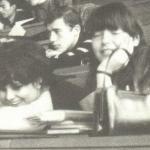Küçük Ayşe, küçük Ayşe,
N'apıyorsun bana söyle
Bebeğime bakıyorum
Ona ninni söylüyorum...
Little Ayşe, little Ayşe
Tell me what you're doing
I am looking after my baby
Singing my baby lullabies
Küçük asker, küçük asker,
N'apıyorsun bana göster
Tüfeğime bakıyorum
Ona süngü takıyorum
Little soldier, little soldier
Tell me what you're doing
I am looking after my rifle
Putting the bayonet on my rifle
Male citizens should love their rifles, take good care of them, and always be ready to fight "for their nation." Yet, what do these male-citizen-soldiers think as they take up arms and become warriors? What happens when they turn from the "unknown soldier," or Mehmetçik (little Mehmet) in Turkish, into narrators of real-life experiences of war and fighting?
Insights into the conflict
Nadire Mater's pathbreaking work Mehmedin Kitabı set out to answer these questions for the Turkish public in 1999. As a result, Mater and her publisher Semih Sökmen (Metis) were tried in court for "insulting and belittling the military," which ended with acquittal. After becoming a best-selling book in Turkish and being translated into German, Finnish, Italian and Greek, this significant work is finally available in English with an inspiring foreword by Cynthia Enloe ( Voices from The Front, trans. Ayşe Gül Altınay (*), Palgrave Macmillan , 2005).
The fifteen year long (1984-1999) warfare between PKK (Kurdistan Workers'Party) and the Turkish Armed Forces claimed at least 30,000 lives. In 1999, the clashes died down after Abdullah Ocalan, PKK's leader, was captured in Kenya. While Öcalan remains in a high-security prison with a life sentence, the PKK, mentioned in the European Union's list of terrorist organizations, decided to resume violence in June 2004.
The English translation of Mater's book appears at this critical juncture of increasing armed violence and growing tensions due to the prospect of a semi-autonomous Kurdistan in Northern Iraq. Voices from the Front promises to bring new insights to the recent history of this conflict and its implications for the "unknown soldiers" who have been its main actors. The book is not only about this particular war; it provides many insights about the workings of nationalism, military service, militarism, and gender ideologies everywhere.
42 young men from diverse backgrounds
"The military experience of the forty-two young men, most of whom I came to know in 1998, had started with the order 'Liiiine upppp,' as they stepped through the gates of the barracks. Now, not because they are ordered to do so, but because they feel that it is high time, they have voluntarily lined up in order to share their experiences with you," (p.10) writes Nadire Mater in her short preface to Voices from the Front. There are no official figures on how many young men have become involved in this conflict, however, Mater suggests that a rough estimate would be around two and a half million. Including the families, this means that about fifteen million people were directly affected by the war through the experience of soldiering. Yet, despite their large numbers, conscripted soldiers have not become a part of the debate on the war or the Kurdish issue in general, except for their dead bodies. Through the accounts of the forty-two men in this book, for the first time, ordinary soldiers enter the debate.
The ex-soldiers interviewed by Mater come from diverse backgrounds. Among the forty-two interviewees, there are five self-claimed Kurds, one Yoruk, one Roma, two Christians (one Armenian, one Greek) and two Alevis. Geographically speaking, all regions of Turkey are represented in terms of their places of origin and we learn that the interviews took place in more than ten cities, several small towns and two villages. About one third of the interviewees are elementary school graduates, one third are high school graduates and one third have received higher education. Regarding their political preferences, there is a remarkable diversity and a balanced representation. The spectrum ranges from anarchists to ultra-Turkish-nationalists, from laicists to Islamists, representing almost all political positionings in Turkey (except perhaps ultra-Kurdish-nationalism). A majority of the interviewees seem to come from lower to middle income families and one fourth were unemployed during the time of the interview. The comprehensiveness and diversity in the religious, ethnic, cultural, social, and economic backgrounds presented in Voices from the Front, is one of the its unique characteristics and main strengths.
"Not comforting"
The testimonies represent the perspectives of those who supported the "fight against terrorism," as well as those who became sceptical as a result of their participation in this fight. For some others, experience of war accompanied a questioning of all forms of nationalism and violence. One of the striking testimonies is of a young Armenian man who comes from a leftist background and ends up questioning the sanctification of death in leftist ideologies: "I am angry with the leftists... The leftists should be much more wary about sending people off to die. We should be the ones to sanctify life, not death!" he says. The emphasis on the value of life in many of other accounts is accompanied by stunning details of experiences of death, conveyed with vivid descriptions of dead bodies, body parts, and blood. Voices from the Front embodies a set of significant challenges to the predominant strategic accounts of war by introducing an ethnographic perspective and highlighting the human face and costs of war.
Nadire Mater ends her short preface to the book reciting something she heard many times during the interviews: "I wish I had nicer things to tell you, not these," and she adds, "Me too..." Voices from the Front is not an easy book to read. "Silence is comforting to many militarized nation-states. This book is not comforting," writes Cynthia Enloe in her powerful Foreword.
Sharing experiences with others
One can only imagine how discomforting it must have been to recite or listen to the testimonies that make up this book. A young man from Istanbul explains his reasons for coming out and telling his story: "I have told you all this because I feel responsible. I want others to learn from my experiences. I would not enjoy telling these things to an ordinary person. But with you, I know that I am telling my story to thousands of people. So, they will know what I have lived through. Some will accept it, others won't. But no one can blame me because I did what I had to do" (p.74-75). Many other interviewees confess that they have not shared these experiences with anyone else before Nadire Mater. It is very fortunate that this important sharing has transgressed many linguistic boundaries and is now available for English-speaking readers at another important juncture in the history of "the Kurdish conflict" in Turkey, as well as of war and militarism globally.
______________________________________________
(*)Ayse Gül Altinay: Author of The Myth of the Military-Nation: Militarism, Gender and Education in Turkey (Palgrave Macmillan, 2004) and translator of Voices from the Front. For a longer review of the Turkish edition of Voices from the Front, see Ayşe Gül Altınay, "Mehmedin Kitabı: Challenging Narratives of War and Nationalism," New Perspectives on Turkey, Fall 1999, 21: 125-145.







